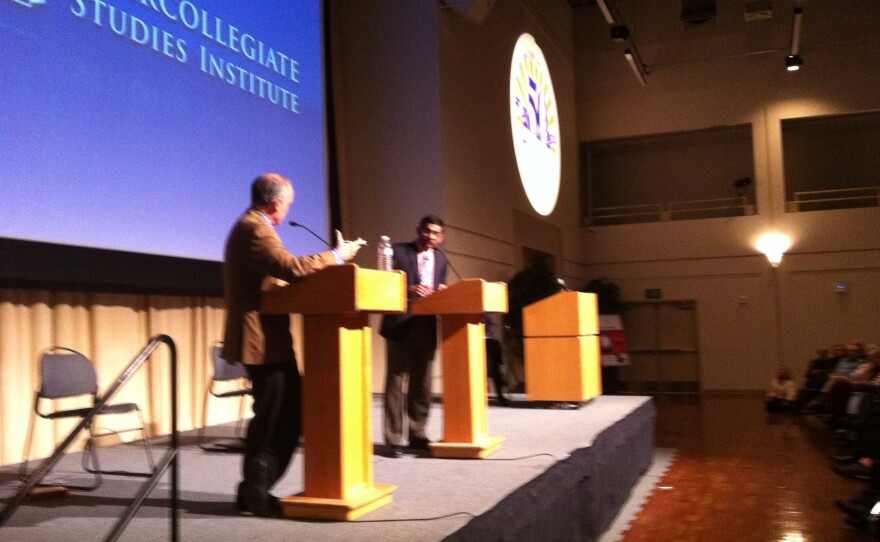I followed a slow line of cars Monday evening as I drove to the top of a parking garage on the UCSD campus. These people and I were arriving to hear a debate over the value of religion, but I never expected to see such a crowd for such an esoteric discussion. This was like going to an Aztecs basketball game.
Belief in God seems to be locked into the human genome. The idea that there’s something greater than us – something beyond us that created all we see – makes sense to people and gives them comfort. That’s why religious faith has survived the advance of science and the ages of reason and enlightenment.
But the official question of this discussion wasn’t whether God existed; it was whether faith in religion was good or bad for society. The debaters on the stage of UCSD’s Price Center Ballroom were conservative provocateur Dinesh D’Souza and fallen minister Dan Barker. Barker was a preacher for 19 years before he saw the light and became an atheist.
The flamboyant D’Souza took the podium first and pronounced his argument to be based not on faith but on reason, and it was reasonable to say that Christianity was the source of the core values that define life in the West. He said Christian civilization was the first and, for a long time, the only society where slavery was even controversial. He said humanists who claim to shun religion are denying the wellspring of their own values.
“Even the atheist is standing on a Christian mountain,” said D’Souza.
Atheist Barker argued The Enlightenment was the source of the core values of the West and religion was “divisive, untrue, unnecessary and morally compromised.” Barker said religion clouds moral judgment. People, he said, can be brutal in any case but when religion gets involved, it gets worse. One of several examples Barker offered was the conflict between Jewish Israelis and Muslim Palestinians.
D’Souza countered by saying Israelis and Palestinians aren’t arguing over religion, they’re arguing over land. Barker responded that their argument wouldn’t be so hard and violent if they didn’t believe the land was theirs because it was given to them by God.
If I had to pick a winner of the debate it was D’Souza. His most compelling point focused on secular atrocities, such as those committed by Hitler, Stalin and Mao. Though Hitler’s targets were the Jews, D’Souza said his rationale was racism and Social Darwinism, not religion. Brutal communist leaders were the followers of Karl Marx and, therefore, overtly atheistic.
Like everyone else, I have a bias in this matter. I’m a believing Christian and I find most atheists aggravating, not because of what they believe but because they insist their opinion is so perfectly rational. It’s not. The conviction that there is no God requires just as big a leap of faith as does the belief in God. I recall a conversation with Michael Shermer, director of the Skeptics Society. He told me a true skeptic must be an agnostic, not an atheist, because the existence of God can be neither proven nor disproven.
Prior to becoming an atheist, Dan Barker was what most people would call a Christian fundamentalist. His ministerial work included stints as a pastor for the Assembly of God and the charismatic Standard Christian Center. Though he wasn’t debating the existence of God on Monday night, he couldn’t bring himself to avoid the subject.
“Go into a children’s hospital and you will know there is no God,” he said.
Do the sufferings of children, and the unanswered prayers of their parents, mean there is no God? To Dan Barker, apparently they do. His statement was a telling glimpse into his anger with what he came to see as an uncaring deity, and then as a deity that did not exist.
Barker also made a point of how monstrous God would be, if he actually existed, by describing God’s cruel violence in the Book of Job. D’Souza argued that’s only a problem for a Christian if he believes the Book of Job is a historic text, and not a fable. Maybe Barker did take the bible literally.
At the end of the debate a few members of that crowd of 1,500 lined up behind two microphones to ask questions or harangue the speakers. One woman complained that she’d seen another debate between D,Souza and Barker and was frustrated that this one was pretty much the same. They were no closer to a resolution of the God question or the religion question.
I’d tell that person to find new ways to spend her free evenings. And I’d also say that belief or disbelief in God is something that ultimately defies reason. Spiritual truth relies on what you feel in your heart and what you hear when you’re alone with your meditations.
What did we learn Monday night? To Dan Barker, God was a fraud. To his debating partner, the universe would be a barren place if we had nothing but ourselves to worship.
“What does atheism deliver but a counsel of complete despair?” said D’Souza.






